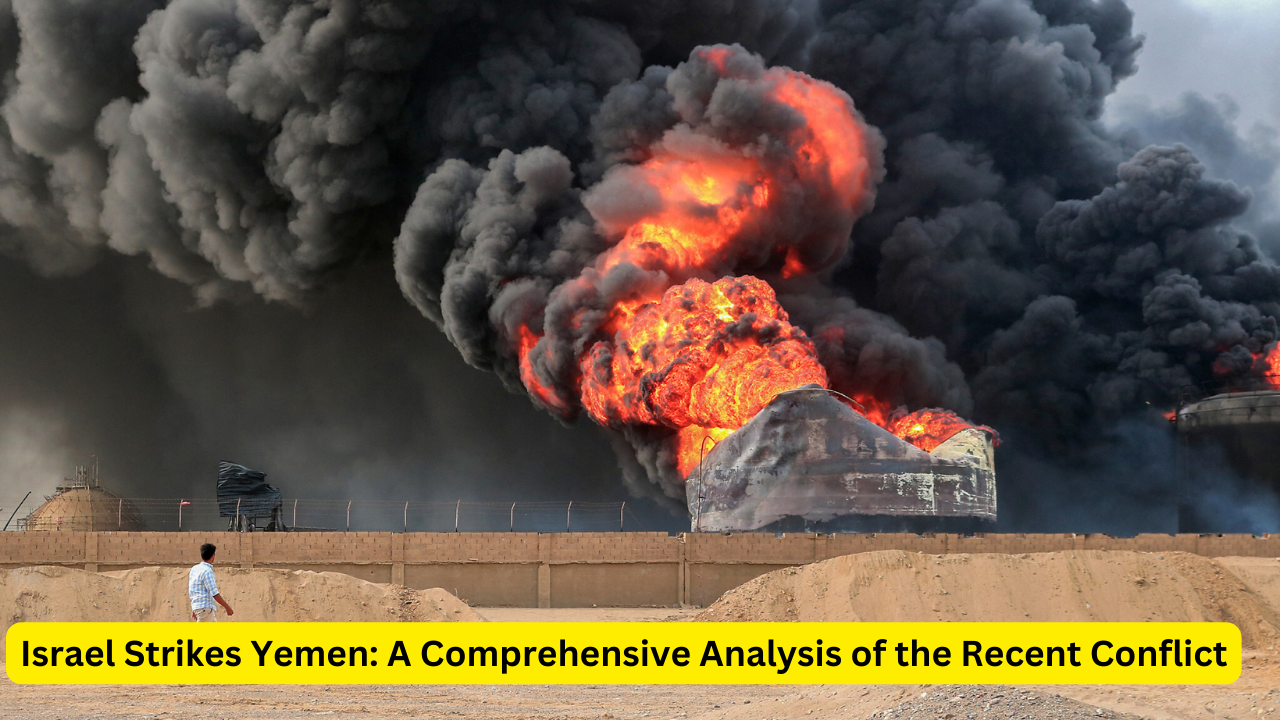Introduction
The recent escalation in the Middle East has seen Israel conducting several military strikes on Houthi targets in Yemen. This aggressive response comes in the wake of attacks that have threatened Israeli security and stability in the region. In this detailed analysis, we will explore the reasons behind these strikes, the strategic implications, and the broader geopolitical context. This article aims to provide an in-depth understanding of the situation, helping readers grasp the complexities of this conflict.
Background of the Conflict
The conflict between Israel and the Houthi rebels in Yemen is a relatively recent development in the long-standing instability of the Middle East. The Houthis, a Shia Muslim group backed by Iran, have been fighting the Yemeni government and its allies since 2014. This conflict has drawn in various regional powers, each with their own strategic interests. Israel’s involvement is primarily driven by concerns over Iran’s influence in the region and the potential threat posed by the Houthis.
Reasons Behind the Strikes
1. Response to Houthi Attacks
The immediate trigger for Israel’s strikes was a series of attacks launched by the Houthi rebels. These attacks included missile and drone strikes targeting key Israeli infrastructure and civilian areas. The Houthis claimed responsibility for these attacks, citing Israel’s support for Saudi Arabia in the Yemeni conflict as justification.
2. Strategic Deterrence
Israel’s military strategy often includes preemptive strikes aimed at deterring future aggression. By targeting Houthi military installations, missile launch sites, and command centers, Israel aims to diminish the Houthis’ capability to launch further attacks. This approach is consistent with Israel’s broader security doctrine, which emphasizes maintaining a qualitative military edge over potential adversaries.
3. Regional Power Dynamics
The strikes on Yemen can also be seen as part of a larger regional power struggle between Israel and Iran. Iran’s support for the Houthis is a key element of its strategy to project power in the Middle East and challenge Israel’s dominance. By targeting the Houthis, Israel is indirectly confronting Iran, sending a message that it will not tolerate Iranian influence in its vicinity.
Impact of the Strikes
1. Humanitarian Consequences
The military strikes have had significant humanitarian impacts. Yemen, already devastated by years of conflict, faces further hardships due to these new attacks. Civilian casualties, displacement, and destruction of infrastructure are some of the immediate consequences. The international community has expressed concern over the worsening humanitarian crisis, urging all parties to seek a peaceful resolution.
2. Geopolitical Ramifications
The strikes have further complicated the geopolitical landscape of the Middle East. They have strained Israel’s relations with some of its regional allies, while simultaneously strengthening its ties with others who view Iran as a common enemy. The United States and other Western powers have shown support for Israel’s right to defend itself, but have also called for restraint to prevent further escalation.
3. Military Outcomes
From a military perspective, the strikes have achieved some of their intended objectives. Key Houthi military assets have been destroyed, and the group’s operational capabilities have been temporarily diminished. However, the Houthis remain a formidable force, and their ability to regroup and retaliate cannot be underestimated. The conflict is likely to continue, with periodic flare-ups and ongoing violence.
International Reactions
1. United Nations
The United Nations has condemned the escalation of violence and called for immediate ceasefire negotiations. The UN Secretary-General has urged all parties to respect international humanitarian law and protect civilian lives. Efforts to mediate a peaceful resolution are ongoing, but progress has been slow due to the entrenched positions of the conflicting parties.
2. Regional Responses
Responses from Middle Eastern countries have been mixed. Saudi Arabia and the United Arab Emirates, both adversaries of the Houthis, have expressed support for Israel’s actions. In contrast, countries like Turkey and Qatar have criticized the strikes, calling for a diplomatic solution to the conflict. Iran has predictably condemned the strikes, pledging continued support for the Houthi rebels.
3. Global Powers
Global powers, including the United States, Russia, and China, have all weighed in on the conflict. The US has reaffirmed its support for Israel’s right to self-defense, while also advocating for de-escalation. Russia and China have called for restraint from all parties and have emphasized the need for a negotiated settlement. The involvement of these global powers adds another layer of complexity to the conflict, highlighting its far-reaching implications.
Conclusion
The recent Israeli strikes on Houthi targets in Yemen represent a significant escalation in the ongoing Middle Eastern conflict. Driven by immediate security concerns and broader strategic interests, Israel’s actions have had far-reaching humanitarian and geopolitical consequences. As the situation continues to evolve, it is crucial for the international community to intensify efforts towards a peaceful resolution. The complexity of the conflict underscores the need for a nuanced approach that addresses both immediate security threats and long-term regional stability.
